Mara van der Lugt (Director)
Mara van der Lugt is a lecturer in philosophy at the University of St Andrews, working mainly on the history of philosophy (17th C – current day) but also on issues in contemporary philosophy and ethics; she is the author of Dark Matters: Pessimism and the Problem of Suffering (Princeton 2021) which discusses the philosophical tradition known as ‘pessimism’ and the debate on whether life is worth living.
Elizabeth Ashford
http://www.st-andrews.ac.uk/philosophy/dept/staffprofiles/?staffid=92
Jessica Brown
Epistemology, moral and epistemic responsibility, philosophical methodology
Prof Brown’s main areas of research are epistemology, responsibility, and philosophical methodology.
Within epistemology, she works on a wide range of issues concerning both individual and group epistemology, including evidence, knowledge, justification and defeat, the closure and transmission of knowledge and warrant, fallibilism vs infallibilism, contextualism vs invariantism, scepticism, the epistemic norms of assertion and practical reasoning, blameworthy belief, epistemic blame.
Within responsibility, Prof Brown is interested in both epistemic and moral responsibility as it affects both individuals and groups. She is currently writing a book on group epistemology and responsibility.
Within philosophical methodology, Prof Brown is interested in a range of methodological issues including the nature of philosophy (it’s subject matter and evidence); the role of ordinary language, linguistics and conceptual analysis in philosophy; thought experiments and intuitions; and, sources of scepticism about philosophy (disagreement, evolutionary debunking worries, experiment philosophy).
https://www.st-andrews.ac.uk/philosophy/dept/staffprofiles/?staffid=94
Sophie-Grace Chappell
 Sophie Grace Chappell is Professor of Philosophy at the Open University, UK, Leverhulme Major Research Fellow 2017-2020, Visiting Fellow in the Department of Philosophy, St Andrews 2017-2020, and Erskine Research Fellow, University of Canterbury NZ, Spring 2020. She was educated at Magdalen College, Oxford, and Edinburgh University. She was Director of the Scots Philosophical Association, 2003-2006. Since 2000 she has been Reviews Editor of The Philosophical Quarterly and Treasurer of the Mind Association. In 2021 she will be a REF sub-panellist for Philosophy. She has published over a hundred articles on ethics, moral psychology, epistemology, ancient philosophy and philosophy of religion. Her books include Aristotle and Augustine on Freedom (Routledge, 1995), Understanding Human Goods (Edinburgh University Press, 2003), The Inescapable Self: an Introduction to Philosophy (Orion, 2005), Reading Plato’s Theaetetus (Hackett, 2005), Ethics and Experience (Acumen, 2009), and Knowing What to Do: Imagination, Virtue, and Platonism in Ethics (Oxford University Press, 2014). She has also edited or co-edited five collections of essays in ethics, most recently Intuition, Theory, and Anti-Theory in Ethics (Oxford University Press, 2015) and Ethics Beyond The Limits: Essays on Bernard Williams’ Ethics and the Limits of Philosophy (Routledge, forthcoming). Her main current research is about epiphanies, immediate and revelatory encounters with value, and their place in our experience and our philosophical ethics. She is a Governor of the British Association of Counsellors and Psychotherapists, a member of the Scottish Mountaineering Club (climbing new winter routes up to grade VII,7), an active poet and translator of the classical Greek dramatists, and an untalented but keen cyclist and pianist. She is the UK’s first openly transgender philosophy academic, having transitioned in 2014. She lives with her family in Dundee.
Sophie Grace Chappell is Professor of Philosophy at the Open University, UK, Leverhulme Major Research Fellow 2017-2020, Visiting Fellow in the Department of Philosophy, St Andrews 2017-2020, and Erskine Research Fellow, University of Canterbury NZ, Spring 2020. She was educated at Magdalen College, Oxford, and Edinburgh University. She was Director of the Scots Philosophical Association, 2003-2006. Since 2000 she has been Reviews Editor of The Philosophical Quarterly and Treasurer of the Mind Association. In 2021 she will be a REF sub-panellist for Philosophy. She has published over a hundred articles on ethics, moral psychology, epistemology, ancient philosophy and philosophy of religion. Her books include Aristotle and Augustine on Freedom (Routledge, 1995), Understanding Human Goods (Edinburgh University Press, 2003), The Inescapable Self: an Introduction to Philosophy (Orion, 2005), Reading Plato’s Theaetetus (Hackett, 2005), Ethics and Experience (Acumen, 2009), and Knowing What to Do: Imagination, Virtue, and Platonism in Ethics (Oxford University Press, 2014). She has also edited or co-edited five collections of essays in ethics, most recently Intuition, Theory, and Anti-Theory in Ethics (Oxford University Press, 2015) and Ethics Beyond The Limits: Essays on Bernard Williams’ Ethics and the Limits of Philosophy (Routledge, forthcoming). Her main current research is about epiphanies, immediate and revelatory encounters with value, and their place in our experience and our philosophical ethics. She is a Governor of the British Association of Counsellors and Psychotherapists, a member of the Scottish Mountaineering Club (climbing new winter routes up to grade VII,7), an active poet and translator of the classical Greek dramatists, and an untalented but keen cyclist and pianist. She is the UK’s first openly transgender philosophy academic, having transitioned in 2014. She lives with her family in Dundee.
Aisling Crean
 Aisling is an Associate Lecturer in Metaphysics and Philosophy of Mind at the University of St Andrews. She has published on trust, trustworthiness and on David Hume’s metaphysics and epistemology. Aisling is also at the dissertation-stage of a MSc in Digital Education at the University of Edinburgh and has published interdisciplinary work on algorithmic inequality and injustice in the context of education. She is interested in developing ethical and sustainable technologies in educational contexts, and philosophical questions related to this that crop up along the way. She is currently working with academic colleagues in the School of Modern Languages and the School of Computer Science to develop a new flexible, accessible, and sustainable digital platform to support the independent learning of languages (beginning with French).
Aisling is an Associate Lecturer in Metaphysics and Philosophy of Mind at the University of St Andrews. She has published on trust, trustworthiness and on David Hume’s metaphysics and epistemology. Aisling is also at the dissertation-stage of a MSc in Digital Education at the University of Edinburgh and has published interdisciplinary work on algorithmic inequality and injustice in the context of education. She is interested in developing ethical and sustainable technologies in educational contexts, and philosophical questions related to this that crop up along the way. She is currently working with academic colleagues in the School of Modern Languages and the School of Computer Science to develop a new flexible, accessible, and sustainable digital platform to support the independent learning of languages (beginning with French).
Rowan Cruft
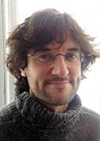 Rowan Cruft works on the nature and moral foundations of rights, paying particular attention to the ways in which different sorts of rights (e.g. natural moral rights, human rights, legal rights, property rights, contractual rights) can be justified. He is currently writing a book on the varied roles played by the individual right-holder’s interests in grounding different types of right. He is keen to demonstrate the legal and policy implications of his work, and has some experience – e.g. presenting at the Scottish parliament on the moral issues surrounding debts taken on by undemocratic states, or at the Leveson Inquiry on the moral foundations of the rights to freedom of expression and a free press.
Rowan Cruft works on the nature and moral foundations of rights, paying particular attention to the ways in which different sorts of rights (e.g. natural moral rights, human rights, legal rights, property rights, contractual rights) can be justified. He is currently writing a book on the varied roles played by the individual right-holder’s interests in grounding different types of right. He is keen to demonstrate the legal and policy implications of his work, and has some experience – e.g. presenting at the Scottish parliament on the moral issues surrounding debts taken on by undemocratic states, or at the Leveson Inquiry on the moral foundations of the rights to freedom of expression and a free press.
http://rms.stir.ac.uk/converis-stirling/person/11646
Alex Douglas
Alex Douglas is interested in the history and philosophy of political economy. His most recent book, The Philosophy of Debt (Routledge, 2015), examines the concept of debt through the lenses of language, history, and political economy. His current research is on theories of desire in Spinoza and other early modern philosophers in relation to the development of political economy. He is also a Research Scholar at the Binzagr Institute for Sustainable Prosperity. And check out Alex’s appearance on the BBC’s In the Balance in April 2019.
Q&A on the Philosophy of Economics with Dr. Alexander Douglas – Session 1
Q&A on the Philosophy of Economics with Dr. Alexander Douglas – Session 2
Q&A on the Philosophy of Economics with Dr. Alexander Douglas – Session 3
Q&A on the Philosophy of Economics with Dr. Alexander Douglas – Session 4
Adam Etinson
 Adam Etinson’s work explores topics in ethics, political philosophy, moral psychology, and social epistemology. At the moment, he is working on projects on anger, dignity, guilt, and wonder.
Adam Etinson’s work explores topics in ethics, political philosophy, moral psychology, and social epistemology. At the moment, he is working on projects on anger, dignity, guilt, and wonder.
Alongside his academic scholarship, Adam also writes for public audiences. His writing has appeared in The New York Times, the Times Literary Supplement, and Dissent.
Check out Adam’s recent publication, “What’s So Special About Human Dignity?” in Philosophy & Public Affairs.
Jade Fletcher
 Jade Fletcher works in metaphysics and social and feminist philosophy. She is particularly interested in places where these areas overlap. Her doctoral research investigated the role of truth in the method of metaphysics and her current research is concerned with the methodological and epistemological challenges of characterising the nature of social reality under conditions of ideological distortion.
Jade Fletcher works in metaphysics and social and feminist philosophy. She is particularly interested in places where these areas overlap. Her doctoral research investigated the role of truth in the method of metaphysics and her current research is concerned with the methodological and epistemological challenges of characterising the nature of social reality under conditions of ideological distortion.
Enrico Galvagni
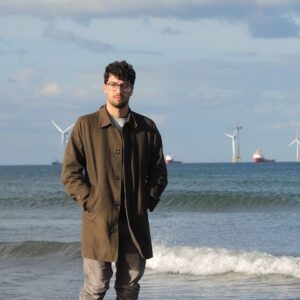 Enrico Galvagni is a Leverhulme Early Career Fellow at the University of Edinburgh and St Leonard’s Associate at the University of St Andrews. His main research interests include early modern philosophy and ethics. Enrico completed his Ph.D. at the University of St Andrews in 2024. He held visiting fellowships at the University of Mainz, New York University, the Göttingen Institute of Advanced Study, and the University of Cologne.
Enrico Galvagni is a Leverhulme Early Career Fellow at the University of Edinburgh and St Leonard’s Associate at the University of St Andrews. His main research interests include early modern philosophy and ethics. Enrico completed his Ph.D. at the University of St Andrews in 2024. He held visiting fellowships at the University of Mainz, New York University, the Göttingen Institute of Advanced Study, and the University of Cologne.
Margaret Hampson
 Margaret Hampson works primarily within the field of Ancient Philosophy, and more specifically Ancient Ethics and Moral Psychology. She is particularly interest in the nature of moral development: how do we learn to be good? How does engagement in certain forms of action influence the sort of persons we become? How do we develop our sense of value and discover the value of certain ways of acting? What role do other people have to play in this process?
Margaret Hampson works primarily within the field of Ancient Philosophy, and more specifically Ancient Ethics and Moral Psychology. She is particularly interest in the nature of moral development: how do we learn to be good? How does engagement in certain forms of action influence the sort of persons we become? How do we develop our sense of value and discover the value of certain ways of acting? What role do other people have to play in this process?
Margaret is currently working on the Aristotelian virtue of magnificence!
Bradley Hillier-Smith
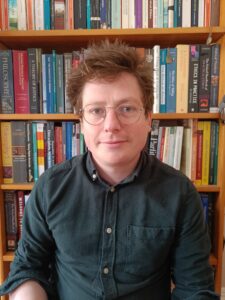 Bradley writes and teaches Moral, Political, and Legal Philosophy. His research specialises in migration ethics, obligations towards refugees, human rights, global justice and applied political ethics. Website: www.bradleyhilliersmith.com/
Bradley writes and teaches Moral, Political, and Legal Philosophy. His research specialises in migration ethics, obligations towards refugees, human rights, global justice and applied political ethics. Website: www.bradleyhilliersmith.com/
James Hutton
 James Hutton is Assistant Professor of Ethics and Philosophy of Technology at TU Delft, Netherlands. His research focuses on emotions, ethical knowledge, and environmental ethics. He defends the idea that we can gain ethical knowledge through emotional experiences and, building on this, he is currently developing a new methodology for environmental ethics which puts emotions front and centre. He also has interests in history of philosophy, especially Kant, the “moral sense” school, and Confucian and Buddhist ethics. His articles have appeared in venues including Canadian Journal of Philosophy, The Philosophical Quarterly, and Ethics.
James Hutton is Assistant Professor of Ethics and Philosophy of Technology at TU Delft, Netherlands. His research focuses on emotions, ethical knowledge, and environmental ethics. He defends the idea that we can gain ethical knowledge through emotional experiences and, building on this, he is currently developing a new methodology for environmental ethics which puts emotions front and centre. He also has interests in history of philosophy, especially Kant, the “moral sense” school, and Confucian and Buddhist ethics. His articles have appeared in venues including Canadian Journal of Philosophy, The Philosophical Quarterly, and Ethics.
Katharine Jenkins
Katharine Jenkins works on the nature of social categories, with particular reference to gender and race. She is interested in how social categories such as races and genders exist, and how these categories are bound up with systematic injustices. She is also interested in feminist philosophy and critical philosophy of race more broadly, in the philosophy of sex and sexuality, and in social epistemology. Topics she has written about include rape myths, pornography, and gender identity and trans rights. Since 2020, she is a Lecturer in Philosophy at the University of Glasgow.
Joel Joseph
Patrick Kaczmarek
 Patrick is the Co-Founder of Bedrock Philanthropy, which provides bespoke management services to high-net-worth philanthropists. He is contributing to the effective altruism research project. His main research interests are population ethics and normative uncertainty.
Patrick is the Co-Founder of Bedrock Philanthropy, which provides bespoke management services to high-net-worth philanthropists. He is contributing to the effective altruism research project. His main research interests are population ethics and normative uncertainty.
King-Ho Leung
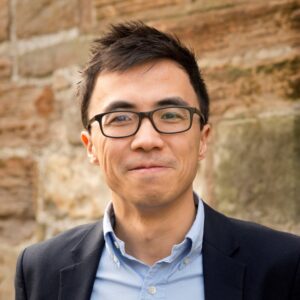 King-Ho Leung works primarily in contemporary continental philosophy, especially in the areas of existential phenomenology, the philosophy of religion (and non-religion), and political philosophy and critical theory. He is particularly interested in the phenomenology of existential commitment and authenticity, as well as how understanding philosophy as a spiritual practice can inform the construal of the religious/secular divide.
King-Ho Leung works primarily in contemporary continental philosophy, especially in the areas of existential phenomenology, the philosophy of religion (and non-religion), and political philosophy and critical theory. He is particularly interested in the phenomenology of existential commitment and authenticity, as well as how understanding philosophy as a spiritual practice can inform the construal of the religious/secular divide.
Jenny L. Mace
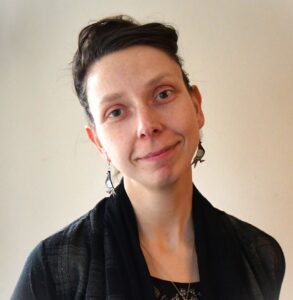 Jenny is a Visiting Scholar with the University of St Andrews. Between 2020 and 2025, she was a remote Associate Lecturer in animal welfare/ethics at the then Centre for Animal Welfare at the University of Winchester, in addition to an External Examiner for Hartpury University’s MSc in animal welfare, policy, and legislation. Jenny conducts both commissioned and pro-bono projects, via Mace Animal Welfare. Alongside animal welfare science, she focuses on applied ethics in relation to human–animal relations. Particular interests include ex-commercial chicken care in addition to, more generally, the incorporation of premature death/killing as a welfare problem. However, her interests and experience are interdisciplinary and span multiple species and all stages of life—especially regarding farmed animals. Jenny is a member of the Editorial Advisory Board of Anthrozoös, and a Fellow of Advance HE. She cares for two rescue cats, one Romanian-rescue dog, and five ex-laying hens. A full portfolio can be seen here.
Jenny is a Visiting Scholar with the University of St Andrews. Between 2020 and 2025, she was a remote Associate Lecturer in animal welfare/ethics at the then Centre for Animal Welfare at the University of Winchester, in addition to an External Examiner for Hartpury University’s MSc in animal welfare, policy, and legislation. Jenny conducts both commissioned and pro-bono projects, via Mace Animal Welfare. Alongside animal welfare science, she focuses on applied ethics in relation to human–animal relations. Particular interests include ex-commercial chicken care in addition to, more generally, the incorporation of premature death/killing as a welfare problem. However, her interests and experience are interdisciplinary and span multiple species and all stages of life—especially regarding farmed animals. Jenny is a member of the Editorial Advisory Board of Anthrozoös, and a Fellow of Advance HE. She cares for two rescue cats, one Romanian-rescue dog, and five ex-laying hens. A full portfolio can be seen here.
Joseph Millum
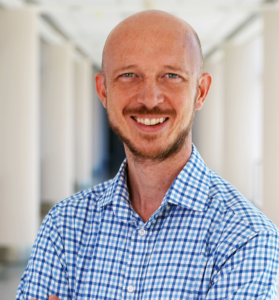 Dr. Millum is a Senior Lecturer in the Department of Philosophy at St Andrews University. He also serves as a consultant to the World Health Organisation and he is the Chairperson of the International Society for Priorities in Health. Prior to arriving at St Andrews, Dr. Millum worked at the US National Institutes of Health for 15 years – in the Clinical Center Department of Bioethics and the Fogarty International Center. Dr. Millum’s research spans various topics in bioethics and applied ethics. These include: (1) Health care priority-setting; (2) Health research priority-setting; (3) Consent; (4) The ethics of research with human participants; (5) Bioethical theory; (6) The ethics of parenthood. His books include Global Justice and Bioethics (2012), The Moral Foundations of Parenthood (2018), Global Health Priority-Setting: Beyond Cost-Effectiveness (2020), and A Theory of Bioethics (2021). Full texts of Dr. Millum’s articles are available at josephmillum.com.
Dr. Millum is a Senior Lecturer in the Department of Philosophy at St Andrews University. He also serves as a consultant to the World Health Organisation and he is the Chairperson of the International Society for Priorities in Health. Prior to arriving at St Andrews, Dr. Millum worked at the US National Institutes of Health for 15 years – in the Clinical Center Department of Bioethics and the Fogarty International Center. Dr. Millum’s research spans various topics in bioethics and applied ethics. These include: (1) Health care priority-setting; (2) Health research priority-setting; (3) Consent; (4) The ethics of research with human participants; (5) Bioethical theory; (6) The ethics of parenthood. His books include Global Justice and Bioethics (2012), The Moral Foundations of Parenthood (2018), Global Health Priority-Setting: Beyond Cost-Effectiveness (2020), and A Theory of Bioethics (2021). Full texts of Dr. Millum’s articles are available at josephmillum.com.
Matyáš Moravec
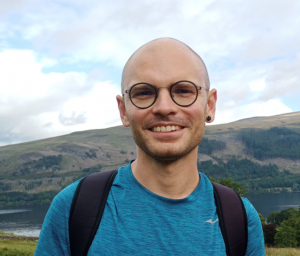
Matyáš primarily works on the philosophy of Henri Bergson (1859-1941), its reception in early 20th-century British metaphysics, and its potential for contemporary analytic philosophy. He is especially interested in Bergson’s relevance to contemporary analytic philosophy of religion. He completed his MA at the University of Aberdeen and his MPhil and PhD at the University of Cambridge. He also spent a year working on Bergson at the École normale supérieure in Paris. Prior to coming to St Andrews, he was postdoctoral research associate at Durham University and lecturer at Queen’s University Belfast. He is originally from the Czech Republic.
Tim Mulgan
 http://www.st-andrews.ac.uk/philosophy/dept/staffprofiles/?staffid=108
http://www.st-andrews.ac.uk/philosophy/dept/staffprofiles/?staffid=108
Quân Nguyen
 Anh-Quân Nguyen is a Post-Doctoral Fellow at University College Dublin. He mostly works on normative ethics, with a specific interest in feminist and environmental ethics, but also their intersections with rationality theory, emotions and social and temporal embeddedness. He was the Scottish coordinator of the COP26 Coalition, directing the civil society alliance organising the international climate movement during the UN Climate Conference in Glasgow in 2021. His doctoral thesis defended the rationality of future-bias against requirements of temporal neutrality
Anh-Quân Nguyen is a Post-Doctoral Fellow at University College Dublin. He mostly works on normative ethics, with a specific interest in feminist and environmental ethics, but also their intersections with rationality theory, emotions and social and temporal embeddedness. He was the Scottish coordinator of the COP26 Coalition, directing the civil society alliance organising the international climate movement during the UN Climate Conference in Glasgow in 2021. His doctoral thesis defended the rationality of future-bias against requirements of temporal neutrality
Fay Niker
Fay Niker’s main research interests are in political philosophy and ethics, though increasingly these are moving her towards exploring topics in moral psychology and social epistemology too. Her work focuses primarily on the ethics of influence, broadly understood. Within this, Fay has been working on: the political morality of nudging (i.e., behavioural public policy); how we might accommodate social embeddedness into our understanding of autonomy and paternalism (including some work on trust); salience and attention, and the ways in which these can be adjusted or curated for the purposes of epistemic and/or ethical ends; and the ethics and politics of “caring technologies”. Given the close relationship between her philosophical topics and public policy, Fay is keen to be involved in projects that reach beyond the academy. She also co-edits a collaborative blog, Justice Everywhere, about philosophy in public affairs.
Theron Pummer
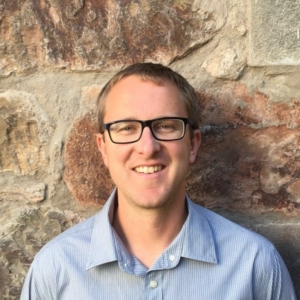 Theron Pummer works on issues in ethics and metaphysics. He has recently completed a book titled The Rules of Rescue: Cost, Distance, and Effective Altruism (Oxford University Press 2023). He is now working on a book titled Hypersensitive Ethics: Much Ado About Nearly Nothing. He has contributed to CEPPA’s Effective Altruism project. He was recently interviewed at the Blog of the American Philosophical Association (APA).
Theron Pummer works on issues in ethics and metaphysics. He has recently completed a book titled The Rules of Rescue: Cost, Distance, and Effective Altruism (Oxford University Press 2023). He is now working on a book titled Hypersensitive Ethics: Much Ado About Nearly Nothing. He has contributed to CEPPA’s Effective Altruism project. He was recently interviewed at the Blog of the American Philosophical Association (APA).
Petronella Randell
 Petronella is an Associate Lecturer in Ethics and Philosophy of Language at the University of St Andrews. Her research focuses on transformative experiences and decision theory, which was the topic of her doctoral thesis ‘Making Transformative Decisions’. Her primary interests are in Epistemology and Ethics.
Petronella is an Associate Lecturer in Ethics and Philosophy of Language at the University of St Andrews. Her research focuses on transformative experiences and decision theory, which was the topic of her doctoral thesis ‘Making Transformative Decisions’. Her primary interests are in Epistemology and Ethics.
Ben Sachs-Cobbe
Ben Sachs-Cobbe is co-leader of the Future of Work and Income project, under which he’s considering the question of on what basis an individual ought to be entitled to a share of society’s wealth. He has published a book on political philosophy and another on ethics, both of which engage heavily with another research interest of his, namely the ethics and politics of our treatment of sentient animals.
- Read Ben’s 2018, 2019, and 2021 articles in The Conversation, as well as his 2017 and 2022 articles in Justice Everywhere
- Also, Ben is the organiser of The Ethics Cup, falling under the Knowledge, Democracy, and Public Discourse project
- Finally, Ben has contributed to the Effective Altruism project through his chapter in the Effective Altruismanthology, edited by Hilary Greaves and Theron Pummer.
Joe Slater
 Joe Slater is a lecturer in moral and political philosophy at Glasgow. He is currently working on issues of moral demandingness, supererogation and friendship.
Joe Slater is a lecturer in moral and political philosophy at Glasgow. He is currently working on issues of moral demandingness, supererogation and friendship.
See Joe’s blog on effective altruism.
Justin Snedegar
 Justin Snedegar’s research is primarily in metaethics and practical reasoning. One strand of this research is to explore the ways in which how we think of the alternatives open to us may influence what we ought to do. Another is to explore the ways that contributory considerations, like reasons for and against different actions, interact and compete to determine what we ought to do, all things considered. His hope is that this work may serve as part of a theoretical background for investigation into deliberation and normative thinking more generally.
Justin Snedegar’s research is primarily in metaethics and practical reasoning. One strand of this research is to explore the ways in which how we think of the alternatives open to us may influence what we ought to do. Another is to explore the ways that contributory considerations, like reasons for and against different actions, interact and compete to determine what we ought to do, all things considered. His hope is that this work may serve as part of a theoretical background for investigation into deliberation and normative thinking more generally.
http://www.st-andrews.ac.uk/~js280/
Luca Stroppa
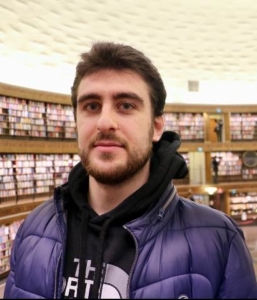 Luca Stroppa’s primary interests are population ethics, climate ethics, moral theories and wellbeing theories. His research focuses on what makes the difference between a life worth living and a life worth not living, and is an attempt to challenge some background assumptions in Population Ethics in order to make some progress towards a population axiology. He is also interested in personal identity, infinite ethics and logical puzzles such as Sorites arguments and spectrum arguments.
Luca Stroppa’s primary interests are population ethics, climate ethics, moral theories and wellbeing theories. His research focuses on what makes the difference between a life worth living and a life worth not living, and is an attempt to challenge some background assumptions in Population Ethics in order to make some progress towards a population axiology. He is also interested in personal identity, infinite ethics and logical puzzles such as Sorites arguments and spectrum arguments.
Jens Timmermann
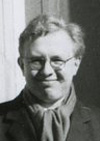 Jens Timmermann works on ethical theory, legal philosophy and applied ethics, mostly from a Kantian perspective.
Jens Timmermann works on ethical theory, legal philosophy and applied ethics, mostly from a Kantian perspective.
Clotilde Torregrossa
 Clotilde Torregrossa works on 1) aesthetic normativity and related/overlapping issues in socio-political, moral, and epistemic normativity, 2) the methodology of both philosophy in general and aesthetics more particularly, 3) the metaphysics and philosophy of mind underlying aesthetic life (especially for film), and 4) the intellectual history of aesthetic thought. She is currently interested in the concept of creative resistance and is writing a book provisionally titled Weapons of Invention: The Philosophy of Creative Resistance. The book bridges debates in political philosophy on the nature, legitimacy, and value of resistance, and the philosophy of creativity. Among other themes, chapters discuss 1) the distinction between a) ‘creating while resisting’, addressed by current aesthetics debates on politically engaged art, ‘artivism’ and ‘craftivism’, and b) ‘resisting creatively’, 2) the value of creative resistance 3) the possibility of collective creative resistance, 4) the political legitimacy of creative resistance, and 5) the relationship between creative resistance and freedom.
Clotilde Torregrossa works on 1) aesthetic normativity and related/overlapping issues in socio-political, moral, and epistemic normativity, 2) the methodology of both philosophy in general and aesthetics more particularly, 3) the metaphysics and philosophy of mind underlying aesthetic life (especially for film), and 4) the intellectual history of aesthetic thought. She is currently interested in the concept of creative resistance and is writing a book provisionally titled Weapons of Invention: The Philosophy of Creative Resistance. The book bridges debates in political philosophy on the nature, legitimacy, and value of resistance, and the philosophy of creativity. Among other themes, chapters discuss 1) the distinction between a) ‘creating while resisting’, addressed by current aesthetics debates on politically engaged art, ‘artivism’ and ‘craftivism’, and b) ‘resisting creatively’, 2) the value of creative resistance 3) the possibility of collective creative resistance, 4) the political legitimacy of creative resistance, and 5) the relationship between creative resistance and freedom.



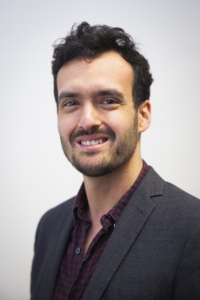
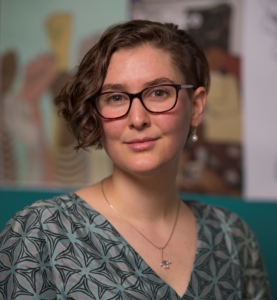



 http://johnhaldane.org/
http://johnhaldane.org/